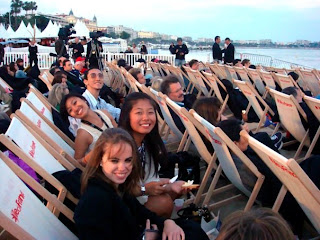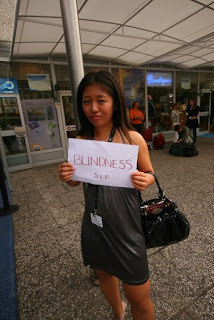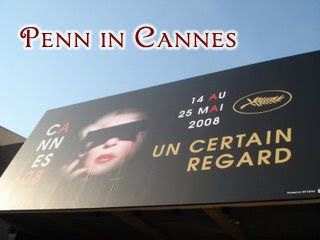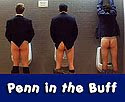So far this week Felisha Liu (W'09) shared some of the good, bad and disappointing films she saw at Cannes, how she managed to score tickets to films through the art of begging, which Penn powerful Penn alumni she met and the excitement of her first walk down the Red Carpet!
In today's last part of our Penn in Cannes series, Felisha tells us about a very special Beach screening of a classic she attended ...and a star who made a surprise appearance!
Click here to read her post!
Get email updates! Submitting a story to Dueling Tampons: What you need to know...
Read Part 1: Penn in Cannes: The Good, The Bad, and The Disappointing
Read Part 2: Penn in Cannes: Begging and Tips For Scoring You Tickets & Access
Read Part 3: Penn in Cannes: Hobnobbing With Penn Hollywood Big Wigs
Read Part 4: Her First Walk Down the Red Carpet
Friend Me Up:![]() MySpace
MySpace ![]() Friendster
Friendster  Twitter
Twitter  Digg
Digg
Per Felisha:"I look around at the crashing Mediterranean waves and realize this is definitely the best class I have ever attended at Penn. Powerful waves envelope the scaffolding that is holding up the gigantic movie screen and high-tech sound equipment. All up and down the Croisette, people stop along the beach to savor Clint Eastwood’s manly portrayal of Dirty Harry (1971). Having arrived early with wine, crackers, cheese and nutella, the Penn-in-Cannes group took over an entire row of beach seating. With complementary blankets to keep me warm and food to satiate my stomach, I was in movie heaven. The audience could talk, eat, drink and socialize during the film—all adding to the enjoyment.
In contrast to the formality of red carpet premieres, the beach screening was a welcome reprieve. The chosen film was a time-tested well-lived classic that had mass appeal despite its 37-year history. The screenplay was simple; anyone can follow the good cop/bad criminal storyline. The pleasure of the film was not in its complex plot or startling artistic direction. Rather, clever one-liners remind viewers why they fell in love with Clint Eastwood in the first place. After being shot, Harry stops the doctor from cutting up his pants, saying, 'For $29.50, let it hurt.' I suspect that English-speakers may have enjoyed the film more those who had to rely solely on subtitles. As one of the few films during the festival that I could understand without subtitles, I thoroughly enjoyed sitting back and relaxing to the sound. My eyes no longer had to race between the words and the screen, afraid of missing a single second. But since Dirty Harry’s success relies on its script, so if the jokes do not translate properly, the humor is lost.
I suspect that English-speakers may have enjoyed the film more those who had to rely solely on subtitles. As one of the few films during the festival that I could understand without subtitles, I thoroughly enjoyed sitting back and relaxing to the sound. My eyes no longer had to race between the words and the screen, afraid of missing a single second. But since Dirty Harry’s success relies on its script, so if the jokes do not translate properly, the humor is lost.
In a surprise appearance, the famed actor and director gave an introduction to the film. Clint posed for a while by the tent, and then walked down the center of the seating area, giving the audience plenty of opportunity to capture his picture. As he departed, his quick-witted humor reminded the audience that he was the fellow with brown-hair in the movie, just in case they couldn’t tell. Clint’s current head of shocking white hair simply adds to his charisma and gives him an air of dignity that is well deserved.
As one of the last films I saw at the Cannes Film Festival, the beach screening was the perfect end to the Penn-In-Cannes program. I leave Cannes with the deepest appreciation for film, two dozen new friends, and great stories to tell. Who else can say that they saw 25 movies, including strutting down the Red Carpet 16 times in a span of 2 weeks? I already have envious friends who are willing to skip graduation so that they can go next year. The allure of Cannes…what a beautiful place."


















 Check out the photos here!
Check out the photos here!


































Win his Shaving Cream!
>The winner!
Win the Cloverfield DVD
My Mugs 4 Yours
See the Entries!